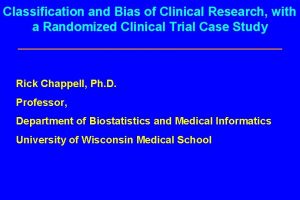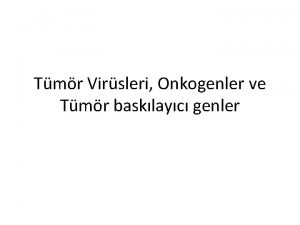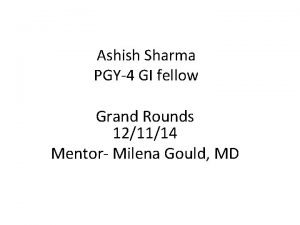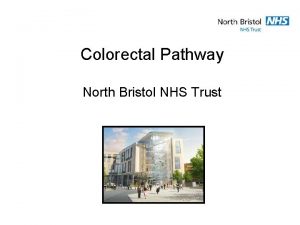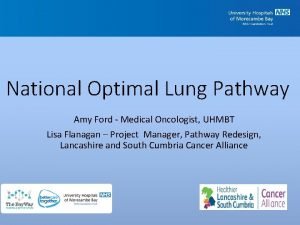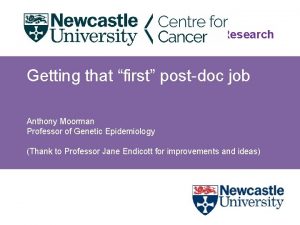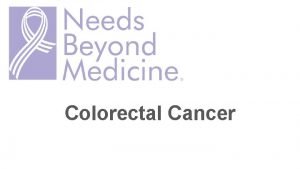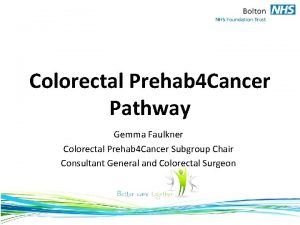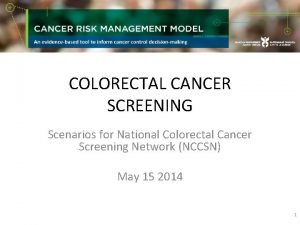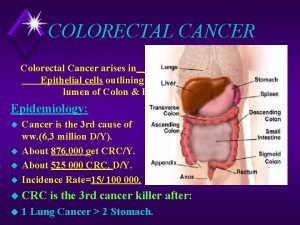Northern Cancer Alliance Colorectal Symptoms Assessment Pathway Guidance











- Slides: 11

Northern Cancer Alliance Colorectal Symptoms Assessment Pathway Guidance for investigating colorectal symptoms in primary care including IDA , Faecal Immunochemical Test (FIT) and Faecal Calprotectin. based on NICE NG 12/DG 30 and York FC pathway and BSG guidance Please note that this guidance does not replace clinical judgement and should be used in conjunction with the clinical assessment and opinion of the responsible doctor(s) V 28

Clinical advice for the commissioning of the whole bowel cancer pathway – November 2017, National Colorectal Cancer Clinical Expert group. • ‘Patients should be referred when high risk symptoms are present for three weeks before referral is made, in line with the advice given by Public Health England awareness campaigns’ • We interpret this to mean abdominal pain and change of bowel habit – not rectal bleeding or anaemia or weight loss Collaborating to improve cancer care

2 WW Criteria or High risk people confirmed IDA (Men and nonmenstruating women >40 y) • New or persistent lower GI symptoms or abdominal pain for > 3 weeks • Unexplained weight loss • Rectal bleeding >50 Y 2 x Platelets >450 6 weeks apart Non-2 WW <50 Y Offer FIT Unexplained confirmed medium risk IDA or clinical suspicion of colorectal cancer consider CT if weight loss sx 2 WW Referral Positive Fit Northern Cancer Alliance Colorectal Symptoms Assessment Pathway Possible IBD/ IBS Negative Fit Offer faecal calprotectin test Repeat after 4 weeks if 100 -250 Rectal Bleeding alone Safety netting in primary care Consider advice and guidance or routine referral for persistent or troublesome symptoms <100 100 -250 >250 Likely IBS Routine GI referral Urgent not 2 WW referral Manage in Primary Care

Patients with bowel symptoms/high risk anaemia for urgent (2 ww) referral Any age with rectal mass Consider 2 ww colorectal clinic referral Any age with abdominal mass or Age 40+ with abdo pain and weight loss Consider 2 ww colorectal referral and/ or contrast CT of abdomen and pelvis Age 50+ with rectal bleeding OR Age 60+ with unexplained change of bowel habit (exclude drug causes and infections first where appropriate) Age <50 with rectal bleeding plus 1 of: • abdo pain • change of bowel habit • weight loss • iron deficiency anaemia FIT positive Consider offering urgent 2 ww colorectal referral for colonoscopy or clinic depending on frailty / patient preference High risk IDA (please offer urinalysis and TTG as well) All men with confirmed IDA with low ferritin and Hb<130 Women – age >50 with confirmed IDA and Hb<115 (irrespective of menopause exclude drug causes and infections) Women age 40 -50 who are postmenopausal or non-menstruating (e. g. Mirena) with confirmed IDA with low ferritin and Hb<115 Consider offering urgent 2 ww colorectal referral for gastroscopy and colonoscopy or clinic depending on frailty / patient preference

Patients with symptoms that do not fulfil 2 WW but may require routine referral for endoscopic tests – please refer by letter via electronic referral system Age<60 with significant watery diarrhoea (Bristol stool type 6 or 7) that impacts on patient’s life for >3 -6/52 (drug and infectious causes excluded) (people 60 and older with unexplained change of bowel habit qualify for 2 ww colonoscopy) Consider routine referral for colonoscopy to rule out microscopic colitis Age<50 with unexplained rectal bleeding alone (people with rectal bleeding plus abdo pain or diarrhoea or anaemia qualify for 2 ww referral) Consider routine referral to colorectal team (but may not be necessary in younger people, people with single occurrence, when there is confirmed fissure or piles or when not the presenting symptom)

Medium risk lower GI symptoms Age 50+ with either of: • Unexplained persistent abdominal pain alone or • Unexplained documented weight loss alone Consider wide range of diagnoses – consider offering Fi. T or routine clinic and/or CT abdomen and pelvis Fi. T negative Fi. T positive Age 50 -59 with unexplained change in bowel habit OR Age 50+ – vague or chronic bowel symptoms of uncertain significance for >3/52 Age <50 suspicion of lower GI cancer Persistent raised platelets >450/dl ( at least 2 recorded at least 6 weeks apart) Consider offering Fi. T to identify people needing 2 WW referral Fi. T positive Fi. T negative If patients does not submit Fi. T within two weeks of request – review in primary care If Fi. T –ve, consider other urgent / 2 ww pathways as appropriate Exclude ovarian cancer in women If Fi. T +ve, consider 2 WW colorectal referral for clinic or straight to test depending on frailty If Fi. T –ve bowel cancer is unlikely. Actively monitor for any new red flags If still concerned, refer as routine to gastroenterology.

Low risk patients: Age <50 with unexplained change in bowel habit +/- abdo pain for >3/52 – consider check Hb and coeliac antibodies Faecal Calprotectin (FC) is considered the more appropriate test in people under 50 instead of FIT IBS suspected - based on ABC (abdo pain, bloating and/or change of bowel habit) Inflammatory Bowel Disease suspected*** check faecal calprotectin (FC) and Hb FC 100 -250 – repeat test No further investigations usually needed FC<100 - Including repeat <100 Monitor and manage symptomatically using IBS pathway. If FC<50 and age<50 99% confidence of IBS https: //cks. nice. org. uk/irritable-bowelsyndrome#!scenario two tests at 100 -250 Offer routine referral for colonoscopy or clinic Collaborating to improve cancer care FC >250 Urgent non-2 WW referral *** - any patient with symptoms suggestive of fulminant colitis should be admitted or seen in OPC clinic urgently

Anaemia – IDA (medium and low risk), isolated low ferritin and unproven IDA = HB < 130 g/ L ( MEN) , 115 g/ L ( Women) AND confirmed by local definition which may include: Ferritin < 15 or Ferritin < 30 and low MCV or Ferritin <30 and low transferrin. Please refer to local lab guidance Medium risk Anaemia: also check t. TG and urinalysis): • • Menstruating women <50 with confirmed IDA • Without rectal bleeding • Menstruation, diet or blood donation unlikely to be the cause Low risk IDA or isolated low ferritin (also offer t. TG and urinalysis) • Menstruating women <50 without rectal bleeding and when menstruation, diet or blood donation is likely as the cause for either an isolated low ferritin or IDA • People with low ferritin but normal Hb Over 60 Yr with unexplained anaemia without confirmed iron deficiency Offer FIT test in primary care Fi. T positive Offer 2 WW referral for bidirectional endoscopy. If patient does not submit Fi. T in 2/52, review in primary care Fi. T negative Treat with iron + active monitoring. Monitor ferritin and Hb and if anaemia recurs 3 months after normalising, consider routine referral to IDA clinic/ Gastroenterology. Check FIT if this has not already been done

2 WW Criteria or High risk people confirmed IDA (Men and nonmenstruating women >40 y) • New or persistent lower GI symptoms or abdominal pain for > 3 weeks • Unexplained weight loss • Rectal bleeding >50 Y 2 x Platelets >450 6 weeks apart Non-2 WW <50 Y Offer FIT Unexplained confirmed medium risk IDA or clinical suspicion of colorectal cancer consider CT if weight loss sx 2 WW Referral Positive Fit Northern Cancer Alliance Colorectal Symptoms Assessment Pathway Possible IBD/ IBS Negative Fit Offer faecal calprotectin test Repeat after 4 weeks if 100 -250 Rectal Bleeding alone Safety netting in primary care Consider advice and guidance or routine referral for persistent or troublesome symptoms <100 100 -250 >250 Likely IBS Routine GI referral Urgent not 2 WW referral Manage in Primary Care

Notes: 1. Fi. T is 85 -90% sensitive for bowel cancer (at lower end of estimate in anaemic patients) and 80% specific at a cut off of 10µ/gm faeces 2. Confirmed IDA may include: IDA = HB < 130 g/ L ( MEN) , 115 g/ L ( Women) AND Ferritin < 15 or Ferritin < 50 and low MCV or Ferritin <50 and low transferrin. There may be local differences in definition please consult local labs 2. Pre-menopausal women have low risk of colorectal cancer or GI causes of anaemia and most need no testing at all. Risk increases between age 40 and 50. Menstruating women younger than 40 with anaemia and no rectal bleeding should rarely need GI anaemia pathway. 3. Young people (<50), and blood donors with low ferritin alone and normal Hb are extremely unlikely to have GI cause and may need no testing or just Tt. G. Older ones may be offered Fi. T. There is no NICE recommendation on low ferritin with a normal Hb. 4. For the low risk patients with anaemia and negative Fi. T, watchful waiting should be purposeful - it generally requires treatment with adequate oral iron for at least three months to ensure that Hb comes back into normal range and iron stores are filled. It is suggested that the patient has repeat ferritin and Hb at 3 and 6 months after adequate treatment. Recurrent IDA is often due to inadequate treatment. If anaemia recurs or does not resolve despite adequate treatment, then consider referral to gastroenterology to consider bidirectional endoscopy 5. Patients >50 with rectal bleeding qualify for 2 ww referral irrespective of anaemia 6. CT colonography is an acceptable means of ruling out bowel cancer as an alternative to colonoscopy and may be offered as a an option form straight to test triage. 7. Urgent 2 ww OPA is preferable to direct access endoscopy if age >80 or major organ dysfunction/frailty or patient wishes 8. Calprotectin should not be used for diagnosis in people >50 – use Fi. T instead (Calprotectin can be used in monitoring known IBD in older patients) 9. This pathway takes into account all NICE guidance + Commissioning advice and Letter from NHC Cancer team and the York faecal calprotectin pathway Collaborating to improve cancer care

Acknowledgements • Dr Mark Welfare Gastroenterologist Northumbria Hosptials NHS Trust • Mr Peter Coyne Colorectal Surgeon Newcastle Hospitals NHS Trust. NCA Colorectal Cancer Clinical Lead • Dr Mel Gunn Gastroenterologist Newcastle Hospitals NHS Trust • Dr John Painter Gastroenterologist Sunderland Royal Hospital NHS Trust. NCA Upper GI Cancer Clinical Lead • NCA Colorectal EAG members • NCA Cancer in the Community Group members • Enquiries to: • Dr Katie Elliott NCA Primary Care Clinical Lead katieelliott@nhs. net Collaborating to improve cancer care
